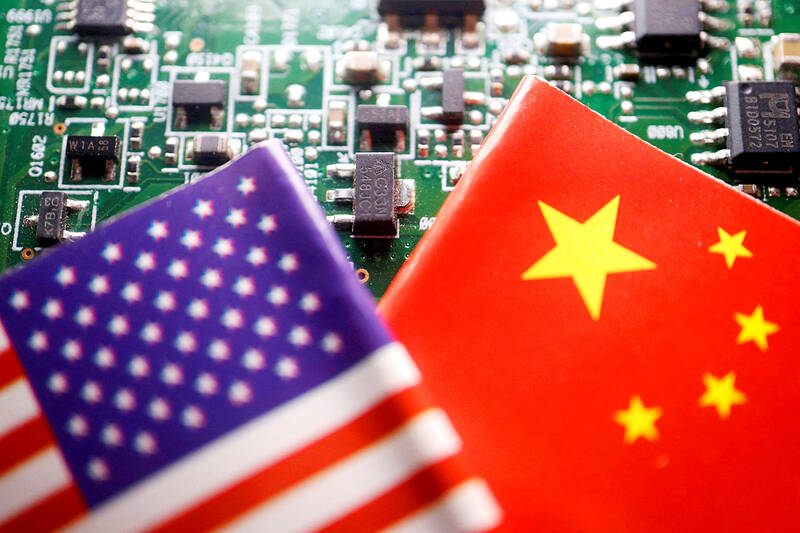US President Donald Trump’s administration is sketching out tougher versions of US semiconductor curbs and pressuring key allies to escalate their restrictions on China’s chip industry, an early indication the new US president plans to expand efforts that began under former US president Joe Biden to limit Beijing’s technological prowess.
Trump officials recently met with their Japanese and Dutch counterparts about restricting Tokyo Electron Ltd and ASML Holding NV engineers from maintaining semiconductor gear in China, people familiar with the matter said.
The aim, which was also a priority for Biden, is to see key allies match China curbs the US has placed on US chip gear companies, including Lam Research Corp, KLA Corp and Applied Materials Inc.

Photo: Reuters
In Beijing, the Chinese Ministry of Foreign Affairs yesterday said that the US plan of coercing other countries into going after China’s semiconductor industry would backfire.
Such actions by the US would hinder development of the global semiconductor industry, ministry spokesman Lin Jian (林劍) told a regular press briefing.
The Trump team’s meetings come in addition to early discussions in Washington about sanctions on specific Chinese companies, other people said.
Some Trump officials also aim to further restrict the type of Nvidia Corp chips that can be exported to China without a license.
They are also having early conversations about tightening existing curbs on the quantity of artificial intelligence (AI) chips that can be exported globally without a license, some of the people said.
It could take months before the talks produce any new US regulations, as Trump makes staffing decisions at key federal agencies. It also remains to be seen whether allies would be more receptive to the new leadership in Washington.
Some officials on the US National Security Council are considering blocking Chinese memory chipmaker ChangXin Memory Technologies Inc (長鑫存儲) from buying US technology, while others also want to intensify restrictions on Semiconductor Manufacturing International Corp (中芯國際), the main chipmaking partner of Chinese telecom giant Huawei Technologies Co (華為).
Then there is the so-called AI diffusion rule, imposed in the final week of Biden’s term. The measure divided the world into three tiers of countries and set maximum thresholds for the AI computing power that can be shipped to each. It also established mechanisms for companies to validate the security of their projects and access higher compute limits.
The rule, which would impact data center developments everywhere from Southeast Asia to the Middle East, drew harsh rebuke from companies including Nvidia. The White House is discussing how to streamline and strengthen that framework, several people familiar with the conversations said, although what that entails is still in flux.
One idea favored by some in the administration would be to reduce the computing power that can be exported without a license. Under current restrictions, chipmakers only have to notify the government before exporting the equivalent of as many as 1,700 graphic processing units (GPUs) to most countries.
Some Trump officials want to reduce that threshold, people familiar with the matter said, which would expand the scope of the license requirement.
Additional reporting by Reuters

TAKING STOCK: A Taiwanese cookware firm in Vietnam urged customers to assess inventory or place orders early so shipments can reach the US while tariffs are paused Taiwanese businesses in Vietnam are exploring alternatives after the White House imposed a 46 percent import duty on Vietnamese goods, following US President Donald Trump’s announcement of “reciprocal” tariffs on the US’ trading partners. Lo Shih-liang (羅世良), chairman of Brico Industry Co (裕茂工業), a Taiwanese company that manufactures cast iron cookware and stove components in Vietnam, said that more than 40 percent of his business was tied to the US market, describing the constant US policy shifts as an emotional roller coaster. “I work during the day and stay up all night watching the news. I’ve been following US news until 3am

UNCERTAINTY: Innolux activated a stringent supply chain management mechanism, as it did during the COVID-19 pandemic, to ensure optimal inventory levels for customers Flat-panel display makers AUO Corp (友達) and Innolux Corp (群創) yesterday said that about 12 to 20 percent of their display business is at risk of potential US tariffs and that they would relocate production or shipment destinations to mitigate the levies’ effects. US tariffs would have a direct impact of US$200 million on AUO’s revenue, company chairman Paul Peng (彭雙浪) told reporters on the sidelines of the Touch Taiwan trade show in Taipei yesterday. That would make up about 12 percent of the company’s overall revenue. To cope with the tariff uncertainty, AUO plans to allocate its production to manufacturing facilities in

COLLABORATION: Given Taiwan’s key position in global supply chains, the US firm is discussing strategies with local partners and clients to deal with global uncertainties Advanced Micro Devices Inc (AMD) yesterday said it is meeting with local ecosystem partners, including Taiwan Semiconductor Manufacturing Co (TSMC, 台積電), to discuss strategies, including long-term manufacturing, to navigate uncertainties such as US tariffs, as Taiwan occupies an important position in global supply chains. AMD chief executive officer Lisa Su (蘇姿丰) told reporters that Taiwan is an important part of the chip designer’s ecosystem and she is discussing with partners and customers in Taiwan to forge strong collaborations on different areas during this critical period. AMD has just become the first artificial-intelligence (AI) server chip customer of TSMC to utilize its advanced

Six years ago, LVMH’s billionaire CEO Bernard Arnault and US President Donald Trump cut the blue ribbon on a factory in rural Texas that would make designer handbags for Louis Vuitton, one of the world’s best-known luxury brands. However, since the high-profile opening, the factory has faced a host of problems limiting production, 11 former Louis Vuitton employees said. The site has consistently ranked among the worst-performing for Louis Vuitton globally, “significantly” underperforming other facilities, said three former Louis Vuitton workers and a senior industry source, who cited internal rankings shared with staff. The plant’s problems — which have not